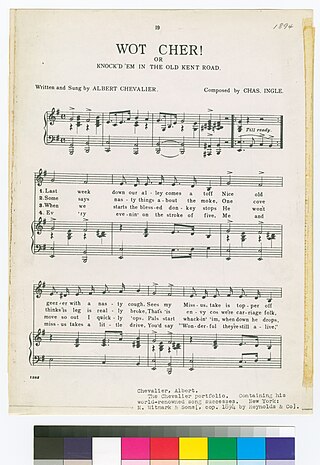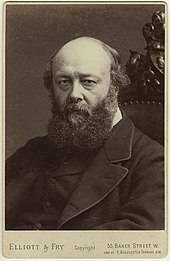
Rhyming slang is a form of slang word construction in the English language. It is especially prevalent among Cockneys in England, and was first used in the early 19th century in the East End of London; hence its alternative name, Cockney rhyming slang. In the US, especially the criminal underworld of the West Coast between 1880 and 1920, rhyming slang has sometimes been known as Australian slang.
Shit is an English-language profanity. As a noun, it refers to fecal matter, and as a verb it means to defecate; in the plural, it means diarrhea. Shite is a common variant in British and Irish English. As a slang term, shit has many meanings, including: nonsense, foolishness, something of little value or quality, trivial and usually boastful or inaccurate talk or a contemptible person. It could also be used to refer to any other noun in general or as an expression of annoyance, surprise or anger.

A double entendre is a figure of speech or a particular way of wording that is devised to have a double meaning, one of which is typically obvious, and the other often conveys a message that would be too socially unacceptable, or offensive to state directly.

LOL, or lol, is an initialism for laughing out loud and a popular element of Internet slang. It was first used almost exclusively on Usenet, but has since become widespread in other forms of computer-mediated communication and even face-to-face communication. It is one of many initialisms for expressing bodily reactions, in particular laughter, as text, including initialisms for more emphatic expressions of laughter such as LMAO and ROFL or ROTFL.

23 skidoo is an American slang phrase generally referring to leaving quickly, being forced to leave quickly by someone else, or taking advantage of a propitious opportunity to leave. Popularized during the early 20th century, the exact origin of the phrase is uncertain.
In-yer-face theatre is a term used to describe a confrontational style and sensibility of drama that emerged in Great Britain in the 1990s. This term was borrowed by British theatre critic Aleks Sierz as the title of his book, In-Yer-Face Theatre: British Drama Today, first published by Faber and Faber in March 2001.

"Beam me up, Scotty" is a catchphrase and misquotation that made its way into popular culture from the science fiction television series Star Trek: The Original Series. It comes from the command Captain Kirk gives his chief engineer, Montgomery "Scotty" Scott, when he needs to be transported back to the Starship Enterprise.

"Shiver me timbers" is an exclamation in the form of a mock oath usually attributed to the speech of pirates in works of fiction. It is employed as a literary device by authors to express shock, surprise, or annoyance. The phrase is based on real nautical slang and is a reference to the timbers, which are the wooden support frames of a sailing ship. In heavy seas, ships would be lifted up and pounded down so hard as to "shiver" the timbers, startling the sailors. Such an exclamation was meant to convey a feeling of fear and awe, similar to, "Well, blow me down!", or, "May God strike me alive and well". Since on the high seas the ship was the sailors' 'world', it may also be interpreted as an exclamation for "shake my world" as the subject being referred to could be, or may be considered a potentially 'world shaking' event.
"Hold your horses", sometimes said as "Hold the horses", is an English-language idiom meaning "wait, slow down". The phrase is historically related to horse riding or travelling by horse, or driving a horse-drawn vehicle. A number of explanations, all unverified, have been offered for the origins of the phrase, dating back to usage in Ancient Greece.
"All Due Respect" is the 65th episode of the HBO original series The Sopranos and the finale of the show's fifth season. Written by David Chase, Robin Green, and Mitchell Burgess, and directed by John Patterson, it originally aired on June 6, 2004.
To kick the bucket is an English idiom considered a euphemistic, informal, or slang term meaning "to die". Its origin remains unclear, though there have been several theories.
"Hail fellow well met" is an English idiom used when referring to a person whose behavior is hearty, friendly, and congenial, in the affirmative sense.
The following is a list of words and formulations commonly used as profanity throughout Romania.

An idiom is a common word or phrase with a figurative, non-literal meaning that is understood culturally and differs from what its composite words' denotations would suggest; i.e. the words together have a meaning that is different from the dictionary definitions of the individual words. By another definition, an idiom is a speech form or an expression of a given language that is peculiar to itself grammatically or cannot be understood from the individual meanings of its elements. For example, an English speaker would understand the phrase "kick the bucket" to mean "to die" – and also to actually kick a bucket. Furthermore, they would understand when each meaning is being used in context.
Digger slang, also known as ANZAC slang or Australian military slang, is Australian English slang as employed by the various Australian armed forces throughout the 20th and 21st centuries. There have been four major sources of the slang: the First World War, the Second World War, the Korean War and the Vietnam War. The name Digger slang derives from the cultural stereotype of the Digger in the First World War. Graham Seal AM, Professor of Folklore at Curtin University of Technology, calls the slang Diggerese. It is a combination of an occupational jargon and an in-group argot.

"Shut up" is a direct command with a meaning very similar to "be quiet", but which is commonly perceived as a more forceful command to stop making noise or otherwise communicating, such as talking. The phrase is probably a shortened form of "shut up your mouth" or "shut your mouth up". Its use is generally considered rude and impolite, and may also be considered a form of profanity by some.
Eighty-six or 86 is American English slang used to indicate that an item is no longer available, traditionally from a food or drinks establishment, or referring to a person or people who are not welcome on the premises. Its etymology is unknown, but seems to have been coined in the 1920s or 1930s.

"Wot Cher! Knocked 'em in the Old Kent Road" is a British music hall comedy song written in 1891 by the actor and singer Albert Chevalier. The score was by his brother and manager Charles Ingle. Chevalier developed a stage persona as the archetypal Cockney and was a celebrated variety artist, with the nickname of "The Singing Costermonger". When first performed it was known simply as "Wot Cher!" The song describes the sudden endowment of apparent wealth on a poor family.
Chinese Internet slang refers to various kinds of Internet slang used by people on the Chinese Internet. It is often coined in response to events, the influence of the mass media and foreign culture, and the desires of users to simplify and update the Chinese language. Slang that first appears on the Internet is often adopted to become current in everyday life. It includes content relating to all aspects of social life, mass media, economic, and political topics and the like. Internet slang is arguably the fastest-changing aspect of the language, created by a number of different influences—technology, mass media and foreign culture amongst others.












